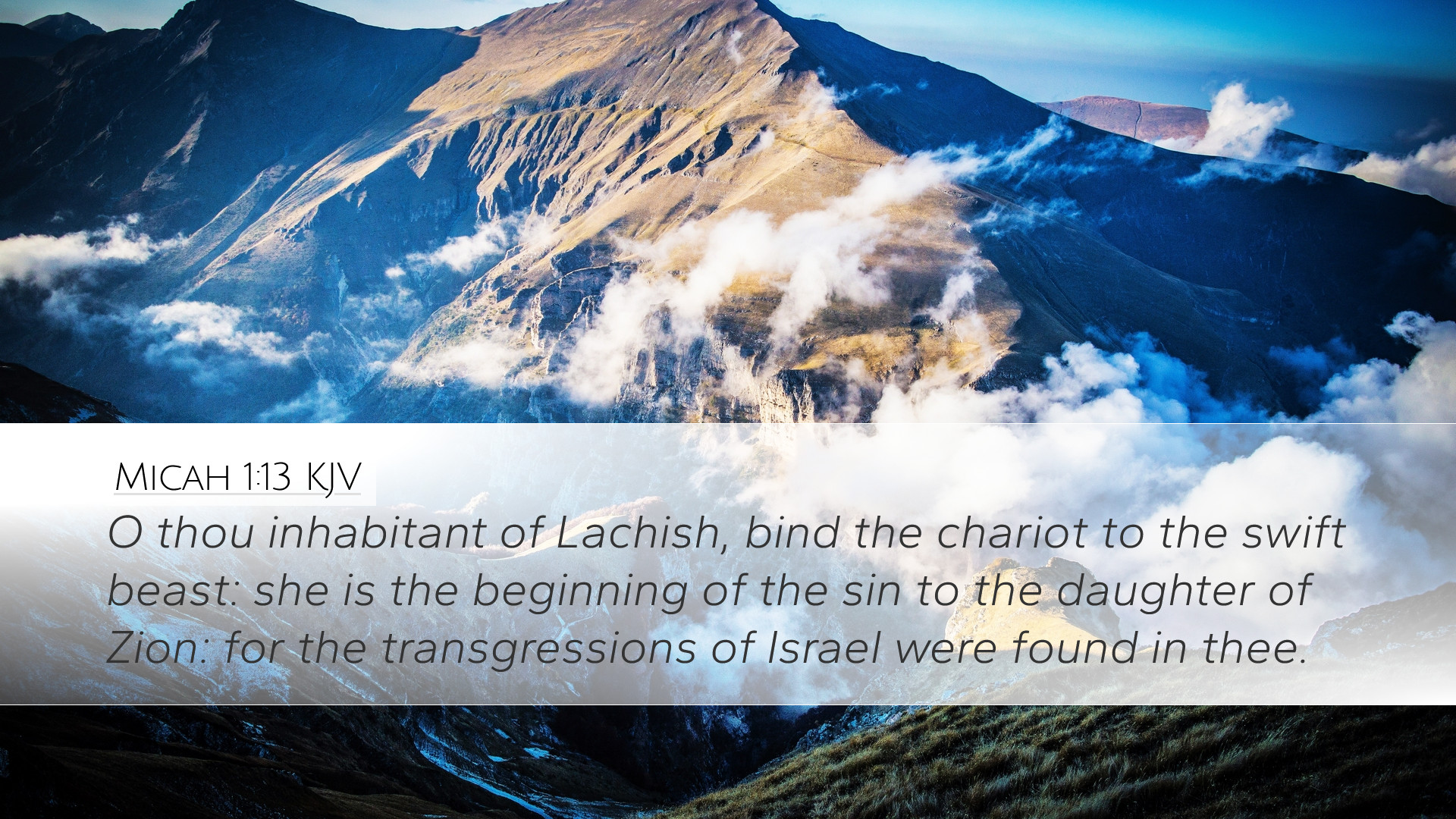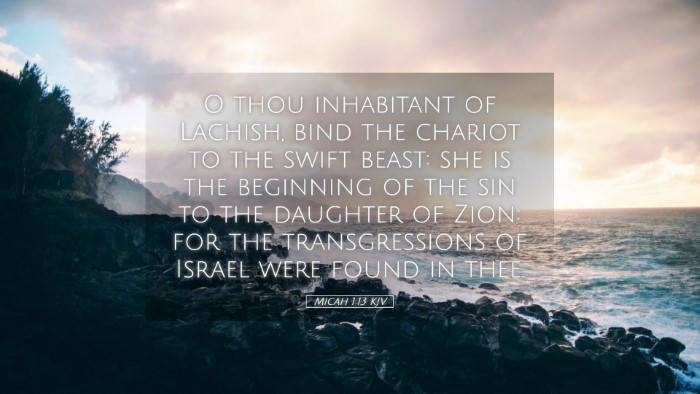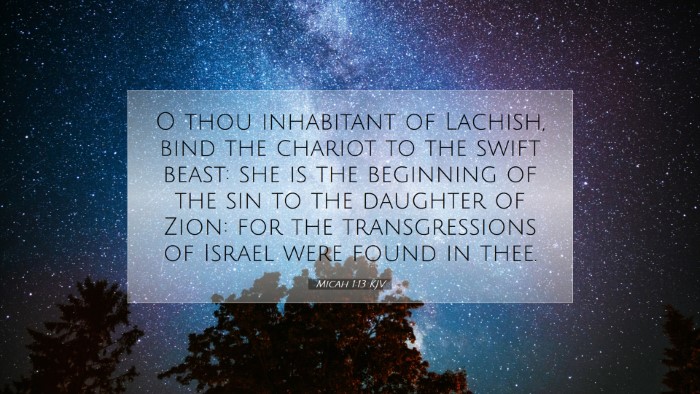Old Testament
Genesis Exodus Leviticus Numbers Deuteronomy Joshua Judges Ruth 1 Samuel 2 Samuel 1 Kings 2 Kings 1 Chronicles 2 Chronicles Ezra Nehemiah Esther Job Psalms Proverbs Ecclesiastes Song of Solomon Isaiah Jeremiah Lamentations Ezekiel Daniel Hosea Joel Amos Obadiah Jonah Micah Nahum Habakkuk Zephaniah Haggai Zechariah MalachiMicah 1:13
Micah 1:13 KJV
O thou inhabitant of Lachish, bind the chariot to the swift beast: she is the beginning of the sin to the daughter of Zion: for the transgressions of Israel were found in thee.
Micah 1:13 Bible Commentary
Commentary on Micah 1:13
Micah 1:13 (KJV): "Thou that dwellest in the clifts of the rock, that holdest the mountain of the plain, thou shalt come down to the plain."
Introduction
The Book of Micah is a profound text situated in the context of impending judgment and calls for repentance. Micah, a contemporary of Isaiah, prophesies to the Southern Kingdom of Judah, addressing the sins and injustices prevalent among the people. Micah 1:13 specifically speaks to the pride and false security of the inhabitants of Samaria, utilizing strong imagery to convey God’s displeasure and the inevitable consequences of their actions.
Contextual Overview
This verse occurs within a passage where Micah depicts the coming judgment against Israel. The prophet provides vivid imagery to depict both the geographical and moral landscapes of his time. Here, the “clifts of the rock” symbolize a false sense of security that the people had derived from their position and strength. The location of the city, situated in a mountainous region, plays a critical role in their sense of invulnerability.
Detailed Exposition
1. Symbolism of the Cliffs and Mountains
Matthew Henry's Commentary: Henry emphasizes the metaphorical significance of the “clifts of the rock.” He asserts that they represent the false confidence people place in their earthly power and resources. Like a nest in the cliffs, they believe they are untouchable granted their fortified cities and natural defenses.
Albert Barnes' Notes: Barnes elaborates that such imagery indicates Israel's reliance on their own strength and military alliances instead of trusting in God. The “mountain of the plain” denotes a time when those who were once secure will be brought low.
Adam Clarke's Commentary: Clarke reflects on how mountains often signify pride and elevation of spirit. The juxtaposition of mountain to plain serves as a reminder of the great reversal that divine judgment entails. This highlights God’s sovereignty over nations and the fallibility of human arrogance.
2. The Invitation to Humility
This verse ultimately serves as a call to humility. The inhabitants are reminded that their current standing is precarious. The prophetic voice via Micah urges them to recognize their limitations and instead seek refuge in God alone.
Matthew Henry: Henry states, “God commands the mighty to descend, not to the plains of pride but to the valleys of humility.” Humbling oneself before God is essential for receiving mercy and restoration.
Albert Barnes: Barnes notes that those who occupy high places and positions of power should be mindful that God's command can bring them low, serving as a divine reminder of human vulnerability.
3. Prophetic Fulfillment and Lessons
While the verse speaks historically to the people of Israel, it simultaneously carries timeless truths for today’s readers. Leaders and nations often derive their confidence from positions of power, wealth, or influence, yet God’s sovereignty renders all human efforts subordinate to His will.
Adam Clarke: Clarke points towards the prophetic dimension where he predicts that despite the seeming sturdy status of Samaria, their downfall was imminent as they strayed from covenant fidelity with Yahweh. The prophecy serves as a perennial warning against the presumption seen in societies that turn away from divine guidance.
4. Contemporary Application
The lessons gleaned from Micah 1:13 can be applied within the context of modern-day faith communities. Leaders are called to practice humility, recognizing their reliance on God rather than on human structure. Similarly, congregational members are reminded that true security comes from faith and obedience to God, rather than earthly advantages.
Matthew Henry: He warns against the pride that comes with stability and wealth. He suggests that believers remain vigilant and committed to a life of faith even amid successes, ensuring that they do not fall into the snare of self-sufficiency.
Albert Barnes: Barnes encourages a reflective posture in light of this verse where the faithful examine the foundations of their trust. The message of Micah is a rallying cry to build lives rooted in God's word rather than in self-reliance.
Concluding Thoughts
Micah 1:13 encapsulates the dual themes of warning and hope, a characteristic of prophetic literature. While judgment is pronounced upon the inflated sense of security by the Israelites, there exists an underlying invitation to return to a humble relationship with God. The challenge remains for contemporary readers to discern the areas of pride and restructure their identities around dependence on divine wisdom rather than on themselves. As we heed the voices of historical commentators, we are reminded that Scripture continuously invites a posture of humility, a return to reliance on our Creator, and a mindful approach to how we wield the power we are entrusted with.


